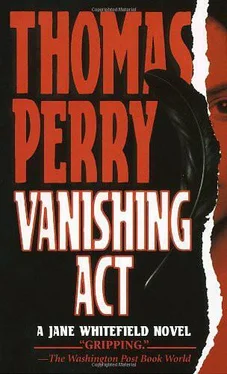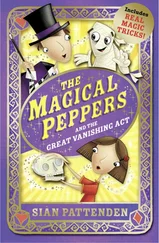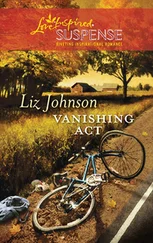Jane looked at him closely for a moment. He was beginning to feel the loneliness of it, and she wasn’t helping. He was never going to have that kind of intimate, open talk again. Even if the other person spilled his guts over a dozen martinis, Felker was going to have to keep quiet. She was just being secretive because it was a habit. Or maybe she was using it to keep him disoriented and off balance so she could be in charge. "I’m sorry," she said. "We’re going to the Six Nations Reserve on the Grand River."
"So his new life is on a Canadian Indian reservation?"
"Who?"
"Harry."
"I wasn’t talking about Harry. I was talking about us." She didn’t like the sound of this, either. "We’re going this way because it was the safest place I could think of when I saw they were that close behind us." She shrugged. "Wherever they think we went, it’s not here."
"Six Nations Reserve. So it’s all of the Iroquois."
"Sort of," she said. "Remember the old fort we passed?"
"Sure."
"That was where the tribes ran to during the Revolutionary War. They had fought on the side of the British for a hundred years, but when the Americans won, the British forgot to put anything in the treaty to protect them. A British general named Haldimand felt guilty and got them this place."
"Is this your reservation?"
"I’m not sure how to answer that," she said. "I’m sort of a citizen because everybody is, but most of the Seneca are still in New York. My family. When the others left, they couldn’t bear to do it. This isn’t exactly a reservation. It’s a sort of refuge. These people have been holding out since 1784."
12
The truck took them out into the country, where there were small farmhouses with lots of automobiles of about the same vintage as the pickup truck, in varying states of disrepair, parked in yards. One that looked as though it must have been left there for a long time had white chickens walking in and out of an open door.
"Is this the reservation?"
"Yes." She studied him for a moment. "What are you thinking—that the people look poor?"
He shrugged. "I wasn’t thinking about them. I was wondering about what they’re going to think of me. I’m wondering how I’m going to fit in."
"You don’t. You just came with somebody who does. This isn’t where I wanted to take you. When you’re running from men with guns, you don’t lead them back to your brother’s house. What I’m doing is wrong, but I felt I had to."
"Are you telling me to behave?"
"I’m telling you how to behave. In some ways they’re no different from the Canadians who live around here. They’re sort of old-fashioned and conservative, but not isolated. They know what you know about the rest of the world. A lot of them work out there. But I don’t want them to know why we’re here. I’m probably the only criminal they know."
"Have you done this before?"
"Done what?"
"Brought people here?"
"Just be polite and friendly. These people are family."
The truck stopped at a farmhouse that wasn’t easy to distinguish from any of the others. It had been painted dark red like a barn, but that appeared to have been a long time ago. In back of the house was a small field that had old corn stubble in it and a small orchard of about twenty leafless fruit trees. When Jane slipped her bag over her shoulder and jumped to the ground, Felker picked up his knapsack and joined her.
Wendell was out of the cab. He said to Felker, "Where do you want your boat?"
Jane smiled. "Please keep it, Wendell. It’s a gift."
Wendell nodded. "Thank you, Janie."
Wendell and Carlton drove off in their pickup truck, and Jane turned to Felker. "Don’t make me explain that."
He looked at the house a little uncomfortably. "Is this where we’re going?"
"Janie!" It was a woman’s voice, and in a moment Felker could see her coming around the house. She was dark brown and her skin had wrinkles at the eyes from smiling, and as she approached, Felker could see them deepen. "It’s wonderful to see you. Come on in." Her voice sounded like the voice of any farm woman, but there was a subtle difference in inflection, and Felker detected a slight peculiarity. When she said "Come," her lips didn’t quite touch. He had noticed the same thing with Wendell when he had said "me," so he supposed he must be noticing an Iroquois accent.
"This is John Felker," said Jane. "Mattie Wilson." Then she added a few Seneca words that seemed to be part of the same topic. When the older woman happily answered her, Felker listened. There were no enunciated b’s, m’s, or p’s.
They entered the house and found themselves in a big farm kitchen. Jane sat down at the table without being asked, at least in English, so Felker did the same. He looked at her for clues, but all he got was a smile.
Mattie Wilson laid out cornbread, honey, and blueberries and poured strong coffee, but she didn’t sit down with them. Instead she hovered, adding dishes of food as they talked. "Jimmy’s off on a job in Brooklyn," she said. "You two should be reasonably comfortable over there."
Jane added commentary. "Jimmy is an ironworker. He and his brothers, George and Henry. They travel a lot."
"When they’re working," said Mrs. Wilson cheerfully. "The rest of the time they eat and lie around like a pack of dogs."
Felker laughed. "I think I hear my mother talking. It makes me homesick."
This seemed to put Mrs. Wilson in an even better mood. "Well, if you’re no better than the rest of the men, I ought to write your mother a letter. Because I know you won’t."
"No," he said. "I don’t think I want you two getting together. I’m no match for her as it is." He tasted the food again. "Just send her the recipe for this cornbread."
Jane watched him in nervous tension. Whenever he spoke he seemed to be teetering on a high place, but each time he went to the edge, he came back with more of Mattie Wilson’s affection.
When she was satisfied that they had eaten enough, Mattie went to a drawer under the counter, found a keychain, and gave it to Jane. "You’d better get settled over there," she said. "Will you be around for o-ta-denone-ne-o-na-wa-ta?"
Jane said, "Maybe," then got up and kissed Mattie Wilson. Felker said, "Thank you, Mrs. Wilson. If I had known how wonderful it is here, I wouldn’t have waited for Jane to bring me. I’d have come alone."
As they left, Mattie said to Jane in Seneca, "Keep one hand on that one. He’s beautiful, but he didn’t learn that much about women from his mother."
They walked among the dried husks in the cornfield, then between the trees of the orchard. "What did she say?" he asked.
Jane smiled. "She said you had a blueberry caught in your teeth."
He swept his tongue around in his mouth. "I do not."
She shrugged. "My Seneca must be getting rusty."
They made their way to a second farmhouse, this one a little better kept up but smaller. Jane walked up onto the front porch, opened the door with the key, and entered. Inside, the house looked like the home of a bachelor, but one who hadn’t been here in some time.
"Is this Jimmy’s farm?"
"Well, title is complicated here," she said. "It’s Jimmy’s house, but it really belongs to his mother because she’s the senior woman of his clan. They don’t divide land like, ’Here’s the boundary; let’s put a fence on it.’ They use what they need until they don’t need it. Jimmy doesn’t have a wife. When he does, he might live here, or he might go live in a house that belongs to her."
"That doesn’t sound too complicated."
"It isn’t," she said. "But sometime in the twenties the Canadian government decided that all Canadian Indians had to be patrilineal. So legal ownership could be in the name of some man who isn’t even related to Jimmy. It doesn’t matter. Right now it’s ours. I’m going to take a bath and go to sleep in it."
Читать дальше












